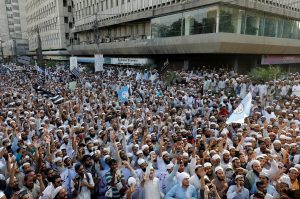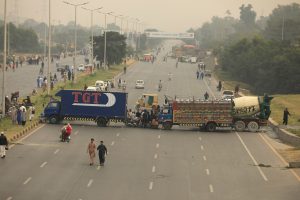
By Asif Shahzad and Mubasher Bukhari
ISLAMABAD/LAHORE, Pakistan (Reuters) – A Pakistani Christian woman has been freed from prison a week after the Supreme Court overturned her conviction and death sentence for blasphemy against Islam, and she is at a secure location in the country, officials said on Thursday.
Officials dismissed some media reports that the woman, Asia Bibi, had been flown abroad, which would enrage hardline Islamists who have been protesting against her release and calling for her to be banned from leaving.
The release overnight of the mother of five prompted immediate anger from an Islamist party that has threatened to paralyze the country with street protests if her acquittal is not reversed.
Bibi, 53, was convicted of blasphemy in 2010 over allegations she made derogatory remarks about Islam after neighbors objected to her drinking water from their glass because she was not Muslim.
She always denied having committed blasphemy.
The case has outraged Christians worldwide, and Pope Francis met Bibi’s family this year, saying he prayed for her. Italy said on Tuesday it would try to help Bibi, who is Catholic, to leave Pakistan.
Pakistan’s foreign ministry denied reports that Bibi had left the country and pointed out that a review of the Supreme Court decision to free her was pending.
“Asia Bibi is completely secure at a safe place in Pakistan,” said ministry spokesman Mohammad Faisal.
“Her writ is in court, when that is decided, Asia Bibi can go anywhere she wants to, she is a free national … if she wants to go abroad, no harm in it.”
In Rome, the Catholic aid agency Aid to the Church in Need (ACN) said Bibi has been able to see her husband in an undisclosed location.
Their daughters were “close by” but had not yet seen their mother as of early afternoon, Pakistan time.
The agency, which arranged a meeting for Bibi’s husband and daughter with Pope Francis at the Vatican this year, said the family was awaiting visas but declined to disclose from which country for security reasons.
Insulting Islam’s Prophet Mohammad carries a mandatory death penalty in Pakistan, which is about 95 percent Muslim and has among the harshest blasphemy laws in the world.
No executions for blasphemy have been carried out in Pakistan but enraged mobs sometimes kill people accused of blasphemy.
Rights groups say the blasphemy law is exploited by hardliners as well as ordinary Pakistanis to settle personal scores.
Christians make up about 2 percent of the population.
‘AGITATED’
Security officials told Reuters early on Thursday that Bibi had been released from a prison in Multan, a city in the south of Punjab province.
She was flown to Islamabad and was in protective custody because of threats to her life, said three officials, speaking on condition of anonymity.
Bibi’s lawyer, who has fled Pakistan and this week sought asylum in the Netherlands, confirmed she was no longer in prison.
“All I can tell you is that she has been released,” lawyer Saif-ul-Mulook told Reuters by phone from the Netherlands, where the government said on Thursday it had offered him temporary asylum.
A spokesman for the hard-line Tehreek-e-Labaik (TLP) party, which took to the streets after the Supreme Court ruling, said her release violated a deal with the government of Prime Minister Imran Khan to end the protests.
“The TLP activists are agitated as the government has breached the agreement with our party. The rulers have showed their dishonesty,” party spokesman Ejaz Ashrafi told Reuters.
Under the deal, the government said it would not block a petition to the Supreme Court to review Bibi’s acquittal in light of sharia, Islamic religious law, the TLP said.
It also said the government promised to work to ensure Bibi could not leave the country.
If the government allows Bibi to leave, it would likely face more paralyzing protests from the TLP and other Islamist parties.
(Reporting by Asif Shahzad and Saad Sayeed in ISLAMABAD, and Philip Pullella in ROME, Bart Meijer in AMSTERDAM; Writing by Kay Johnson; Editing by Grant McCool, Robert Birsel)









